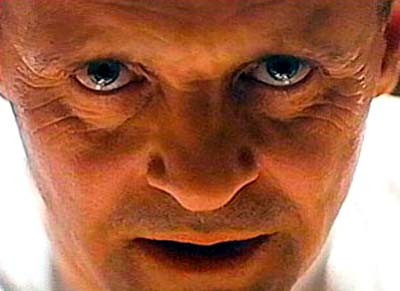
“I ate his liver with some fava beans and a nice chianti.”
Ah, Hannibal. You’re so refined; intelligent; charismatic. And of course in the book, your choices are even more impressive. Amarone is a much better match for liver than chianti is. But us dumb movie-watching schmucks wouldn’t know an amarone from an abalone…
And therein lies the appeal. Hannibal is a bad guy. But he has qualities that we consider desirable in a human being: he’s well educated; he’s eloquent; and he knows a lot about wine.
Crime thrillers need bad guys. Thomas Harris’s stories are great because they feature a terrific bad guy. In fact Red Dragon has two of them. Not only do we have Hannibal playing a secondary role, but there’s Francis Dolarhyde front and centre. He’s a brutal murderer. But he had a difficult childhood, living with his grandmother. He’s facially disfigured. He’s also a sensitive soul, who treats his blind colleague with respect.
So what am I getting at?
The crucial word is “But”.
Tony Soprano is a mob boss, but he has panic attacks. He’s a murderer, but his own mother tries to have him murdered. He’s a womaniser, but – and I think this is perhaps the most important factor – he’s a father, a family man. We spend a lot of time in Tony’s home. He eats cereal from a bowl in his pyjamas. He struggles to keep his kids under control. He hosts barbecues.
Characters are compelling when they’re a big bundle of contradictions. Hannibal eats people. And yet, as Silence of the Lambs hurtles to its climax, we’re willing him to escape. Tony Soprano is a murderous thug. His enemies, though, are also murderous thugs, but we care less about them.
It works the other way, too. Detectives are good guys, right? But Sherlock Holmes is.. well, he’s a bit of an arsehole. And how many of the sleuths we love have problems with alcohol, relationships and authority?
Stories need tension, conflict and uncertainty. A one dimensional hero is always going to go straight for the dragon’s throat. But if he’s shown us earlier in the story that he doubts himself or he lacks the killer instinct, we’re more likely to be on the edge of our seats, waiting to see whether he can overcome his weaknesses. And what if the terrorist, rather than being an angry, ranting lunatic, is charming and persuasive? Could he make the hero hesitate at the crucial moment?
So… if you’re writing a story and it’s lacking something, or you’re watching a film that’s sending you to sleep, ask yourself: where’s the ‘but’? Can you say, she’s bad but…; he’s the hero but…?
Because sometimes the good guys need to be bad and the bad guys need to be good.
If you like complicated, flawed characters you might enjoy my novel ‘PsychoAnalysis’. The ebook is available for pre-order ahead of the October 14th release. The paperback is out now!